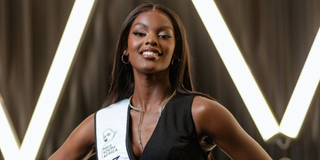South Africa's beauty pageant exposes cracks in tolerance for migrants

Born to a Nigerian father and a mother of Mozambican descent, Chidimma Adetshina has faced a barrage of criticism.
What you need to know:
- Born to a Nigerian father and a mother of Mozambican descent, Adetshina has faced a barrage of criticism and online abuse questioning her right to compete for the coveted Miss South Africa title, despite being a South African by birth.
A burgeoning controversy has engulfed the Miss South Africa pageant as one of the top contestants, Chidimma Adetshina, finds herself at the centre of a heated debate over her eligibility to represent the nation.
Born to a Nigerian father and a mother of Mozambican descent, Adetshina has faced a barrage of criticism and online abuse questioning her right to compete for the coveted Miss South Africa title, despite being a South African by birth.
She was born at the Chris Hani Baragwanath Academic Hospital, the largest hospital in Africa, in the heart of Soweto, South Africa. Despite her deep-rooted connection to the country, her mixed parentage has sparked a heated debate about identity and belonging.

Born to a Nigerian father and a mother of Mozambican descent, Chidimma Adetshina has faced a barrage of criticism.
According to South African immigration laws, if you are born in South Africa and have at least one parent who is a South African citizen or permanent resident, you automatically qualify for South African citizenship.
This debate gained momentum after a video recently surfaced online showing Adetshina with people dressed in traditional Nigerian attire.
This led to discussions about her eligibility to compete for the title. There have been calls on social media for South Africa's Minister of Sport, Arts and Culture, Gayton McKenzie, to get involved.
Mr McKenzie, who is known for his outspoken views on social media, promised to look into the matter. The sports minister also said the country should not have a Nigerian contestant in the Miss South Africa pageant.
“We truly cannot have Nigerians competing in our Miss SA competition. I want to get all the facts before I comment, but it gives funny vibes already,” said McKenzie, shortly after returning from Paris Olympic Games last week.
“Whenever you present yourself to represent South Africans, you are willingly opening yourself up to scrutiny. South Africans shouldn’t be shamed and accused (of malice) simply because they are asking needed questions of the lady who wants to represent them as Miss South Africa.”
The controversy actually began when the 23-year-old law student, model and netball player from Pimville, Soweto, revealed in her Miss SA entry video that her parents are not from South Africa.
As one of the 10 finalists, she has faced increasing criticism as the competition progresses towards crowning the winner.
The winner will be announced at the SunBet Arena in Pretoria on Saturday, August 10. Whether she will be allowed to participate in the final competition remains to be seen.
Miss South Africa organisers have not publicly spoken on the controversy. However, their eligibility criteria are clearly outlined on its website. Miss SA entrants must be South African citizens with a valid South African ID or passport. Individuals with dual citizenship are required to provide details of both passports on the entry form.
“By entering to compete for the title of Miss South Africa 2024, you will be required to consent to and authorise the Miss South Africa organisation to conduct a psychological wellbeing assessment, including resilience testing and background checks to verify the information provided in your entry form, as well as confirmation that you are an upstanding citizen worthy of representing the country.”
Ahead of the crowning ceremony just a week away, a petition has emerged calling for the removal of Adetshina from the competition. But the African National Congress [ANC] Secretary-General Fikile Mbalula has come to Adetshina's defence. The ANC leader has urged the organisers of Miss South Africa and Home Affairs Minister Leon Schreiber to clarify the law regarding competition contestant Adetshina's eligibility.
“We must not be populists; we must be guided by the laws of this country. The organisers of Miss SA are quiet, and they allowed this girl to be attacked. Schreiber, the DA minister, must clarify this issue so they do not allow victimisation,” he said.
“This matter puts a focus on immigration laws and where it places us. Is she entitled to participate? We need to clarify that issue so that we do not allow Chidimma to be victimised.
“Organisers and the government must clarify that issue. She was born here; we must clarify that. What is the law saying? We must not have an unending debate. It is a sensitive issue and it must be clarified.”
Another prominent leader in SA in the Economic Freedom Fighters [EFF] leader president Julius Malema also entered the debate. He stated that the issue of Adetshina's identity is stirred up by those who spread hate among Africans.
"Such people should not be supported,” he said. “We cannot punish people based on where their parents come from. I’ve not followed the debate closely, but I would assume Miss SA has done the necessary due diligence and determined she is a suitable candidate.
“Your citizenship is determined by where you were born, so if she was born here, she’s South African. It doesn’t matter. She’s not her parents, she’s herself. So why say she’s from Nigeria or Mozambique? She was born here.”
South Africa, a nation built on the fabled ‘rainbow’ of people has struggled with accommodating migrants from other African countries. Occasionally, xenophobic attacks erupt as locals blame foreigners from Zimbabwe, Nigeria, Somalia and other places for taking over their income-generating businesses.
But more of that problem is also blamed on the government’s failure to tame inequality and poverty, especially among the South African black people.





